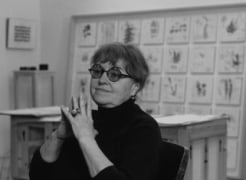
Galerie Lelong & Co., New York is pleased to announce the opening of Michelle Stuart: The Imprints of Time, 1969-2021. Since the 1960s, Michelle Stuart (b. 1933, Los Angeles, CA) has created pioneering works that synthesize Land Art, drawing, photography, painting, and sculpture. As one of the few female land artists of her generation, Stuart’s relation to the earth and mark-making also diverges from male contemporaries in capturing “the handwriting of nature.” The exhibition will present a survey from the late 1960s to the present, including works on paper, sculpture, and photography that highlight the site-specificity of her practice as well as the indexical nature of her works.
Photography is an impression made by the light surrounding a specific place. Stuart’s work, pointing to sites as far reaching as Machu Picchu, Mesa Verde, and the South Pacific, manifests that by physically engaging in mark-making that brings the material aspects of the site into the work. Often combining drawings and organic material into one work, these impressions through Stuart’s hand coexist on the same picture plane. In Islas Encantadas: Seymour Island Cycle (1981-82), a monumental grid of earth-imbued units coexist in dialogue with photographs of flora and fauna, caught in time.
Four works from Stuart’s series Area-Sayreville, New Jersey (1976) are comprised of paper rubbed with earth from the quarry and framed with a row of photographs from the site. The artist’s incorporation of photography, beginning in the 1960s, is one of the earliest demonstrations of photography in Land Art.
The grid is a recurring formal structure of Stuart’s work, synonymous with the cool detachment of Conceptual Art of the 1960s. However, the rationality imposed by the grid is exceeded by the natural elements contained within. Stuart arranges the components in the same way one would work with line, shape, and form, creating a unified composition but with depth that moves the viewers’ eyes back and forth, as demonstrated in the early work El Florido Chart (1980) and a recent photographic work Creation Myth (2020).
Collapsing time, memory and place, Stuart’s work addresses the metaphysical while remaining profoundly rooted in its own materiality and the artist’s interest in archeology, botany and history. Armed with the curiosity of an Enlightenment explorer, she approaches materials from the earth and nature as a collector and archivist, aiming to contain their energetic potential as well as to underscore their fragility as beacons of the dire environmental crisis we currently face.